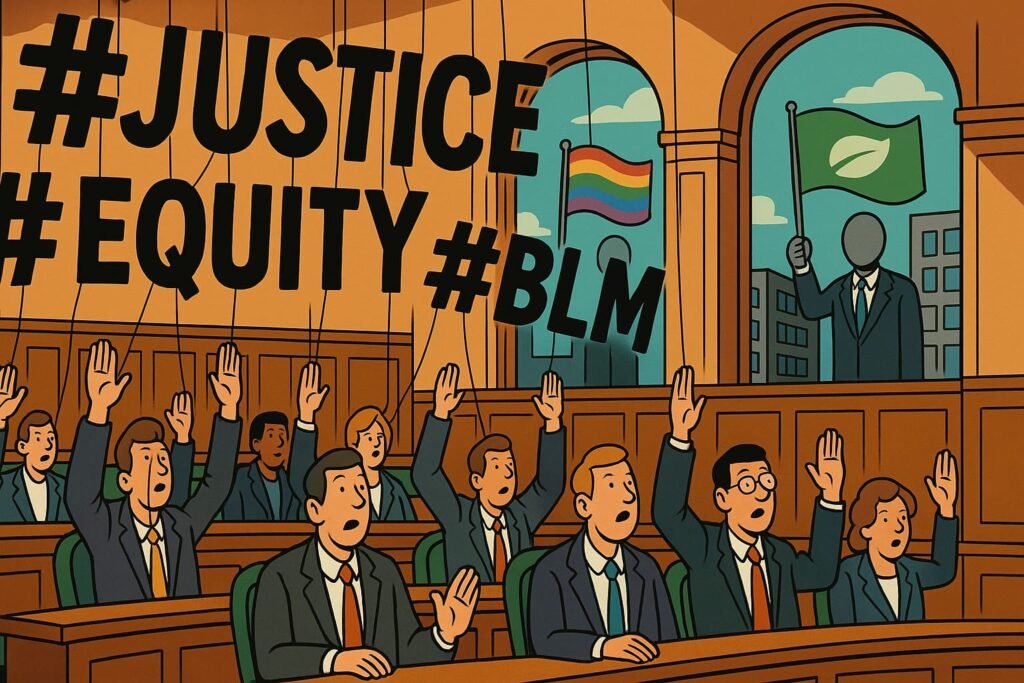Politics & Identity Activism – How Laws Bend Under Pressure
From Votes to Outrage
Politics is supposed to be about voters choosing representatives who write laws for everyone. That’s the theory. In practice, laws today often come not from ballots or debates, but from identity activism: campaigns built on hashtags, media outrage, and corporate endorsements.
Instead of universal rights, politics increasingly bends to the pressure of group-based demands. Governance by principle is giving way to governance by outrage.
Table of contents
The Rise of Identity Activism in Politics
Identity activism focuses on categories — race, gender, sexuality, or other group labels — as the lens for politics. The goal is no longer universal rules for all citizens, but recognition, protections, and privileges for specific groups.
- Hashtags to Law: Viral campaigns like #MeToo and #BLM spill into legislation.
- Corporate Amplifiers: When big brands repeat the slogans, politicians follow.
- Moral Leverage: Disagreeing isn’t treated as disagreement — it’s framed as “oppression.”
This moral framing gives activists far more influence than their numbers would suggest.
How Pressure Becomes Policy
The process is simple — and predictable:
- Outrage spreads online — a hashtag dominates the news cycle.
- Corporations endorse the cause — making opposition look dangerous.
- Politicians calculate risk — and discover it’s safer to bend than to resist.
- Laws or policies shift — not because voters demanded it, but because outrage did.
What looks like democracy in action is often just crisis management by parliament.
Examples of Laws Shaped by Activism
- Speech Codes: Hate speech laws expanded to cover “misgendering” or jokes deemed offensive.
- Quotas: Gender or race-based hiring requirements in public institutions and corporate boards.
- Education Policy: Curricula rewritten around race, gender, and sexuality activism.
- Migration Rules: Border controls reframed as “refugee justice” or “anti-racism.”
These laws aren’t just about governance. They’re political signals of moral alignment with activist causes.
Why Politicians Cave
Politicians don’t bend because the arguments are strong — they bend because the cost of resistance is higher than compliance.
- Fear of Outrage: One viral clip can wreck a career.
- Corporate Pressure: Lobbyists, investors, and HR departments align with activist goals.
- Cheap Moral Posturing: Passing symbolic laws is easier than tackling housing, healthcare, or inequality.
- Vote Engineering: Identity-based laws secure loyalty from select groups.
It’s a survival strategy disguised as principle.
Consequences of Law by Activism
When politics bends to activism, the results are predictable:
- Fragmentation: Each group demands its own carve-outs, eroding universal rights.
- Legal Overreach: Ordinary disagreement risks criminalisation if framed as “hate.”
- Weakening Democracy: Laws reflect activist noise, not voter priorities.
- Empowered Elites: NGOs, think tanks, and corporations gain power while citizens lose it.
The law stops being about fairness for all and becomes about appeasing the loudest.
Activism with Footnotes
Outrage alone doesn’t pass a bill — it needs a “study” to make it look official. That’s where research justice comes in. Governments lean on activist-approved reports as a shortcut to legislation, treating ideology in a lab coat as hard evidence.
Governance by Outrage
Laws and policies are supposed to balance the interests of an entire nation. Instead, they’re increasingly written in response to activist pressure, corporate lobbying, and fear of bad PR.
The irony? A system built to represent all citizens now spends most of its energy carving out exceptions. Universal rights are sidelined, replaced by identity carve-outs.
Politics is no longer about governing — it’s about bending the knee to outrage.
FAQ: Politics & Identity Activism
What is identity activism in politics?
It’s group-based activism (race, gender, sexuality, etc.) that pressures lawmakers to change laws and policies.
How does it influence politics?
Through hashtags, media outrage, and corporate lobbying that push politicians to adopt activist agendas.
What are examples of identity-driven laws?
Hate speech expansions, hiring quotas, education reforms, and migration rules reframed as “justice.”
Why do politicians cave to activism?
Because resistance brings outrage, bad PR, and corporate disapproval, while compliance earns easy moral credit.
What’s the danger of law by activism?
It fragments society, weakens democracy, and replaces universal rights with identity-based privileges.



